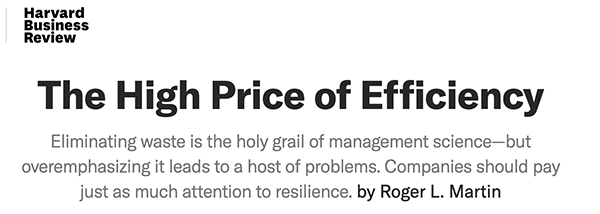
The right framework can uncover the most hidden of assumptions. For example, the 2021 winter blackouts in Texas. While the politicians and news debate over windmills, natural gas, and deregulation, they are missing the the framework and thus talking trees instead of forest.


The better way to look at this problem is the consequence of a hidden tradeoff we make with all our big, complex systems: efficiency vs. resilience.
The Texas power grid is efficient. It provides low-cost electricity to millions of people, when all goes well. The same can be said of the power grid in California, which similarly does just fine, when there are no wildfires or droughts or earthquakes or other uncommon events.
The drive toward efficiency is why we allow big companies to buy other big companies. They sell the public and government on those deals by telling us how much more efficient the combined entity will be.
Efficiency is why AT&T was once a telephone monopoly, and why today Americans have just three choices of mobile phone provider and usually just one choice of internet provider. Monopolies are efficient.
Efficiency is why Google provides 90%+ of all the internet searches on the planet, why Facebook has no peers, and why Amazon keeps growing.
What society fails to notice in optimizing efficiency is that it is in fact a tradeoff. We notice that tradeoff only when all doesn’t go well. Drop a 100-year winter storm on Texas, as all that efficiency leads to multiple millions of people without electricity, heat, or water.
If 2020 taught us nothing, it taught us that things don’t always go as planned. If we are to expect the unexpected then we need to stop solely optimizing for efficiency and leave some resilience in our systems.















